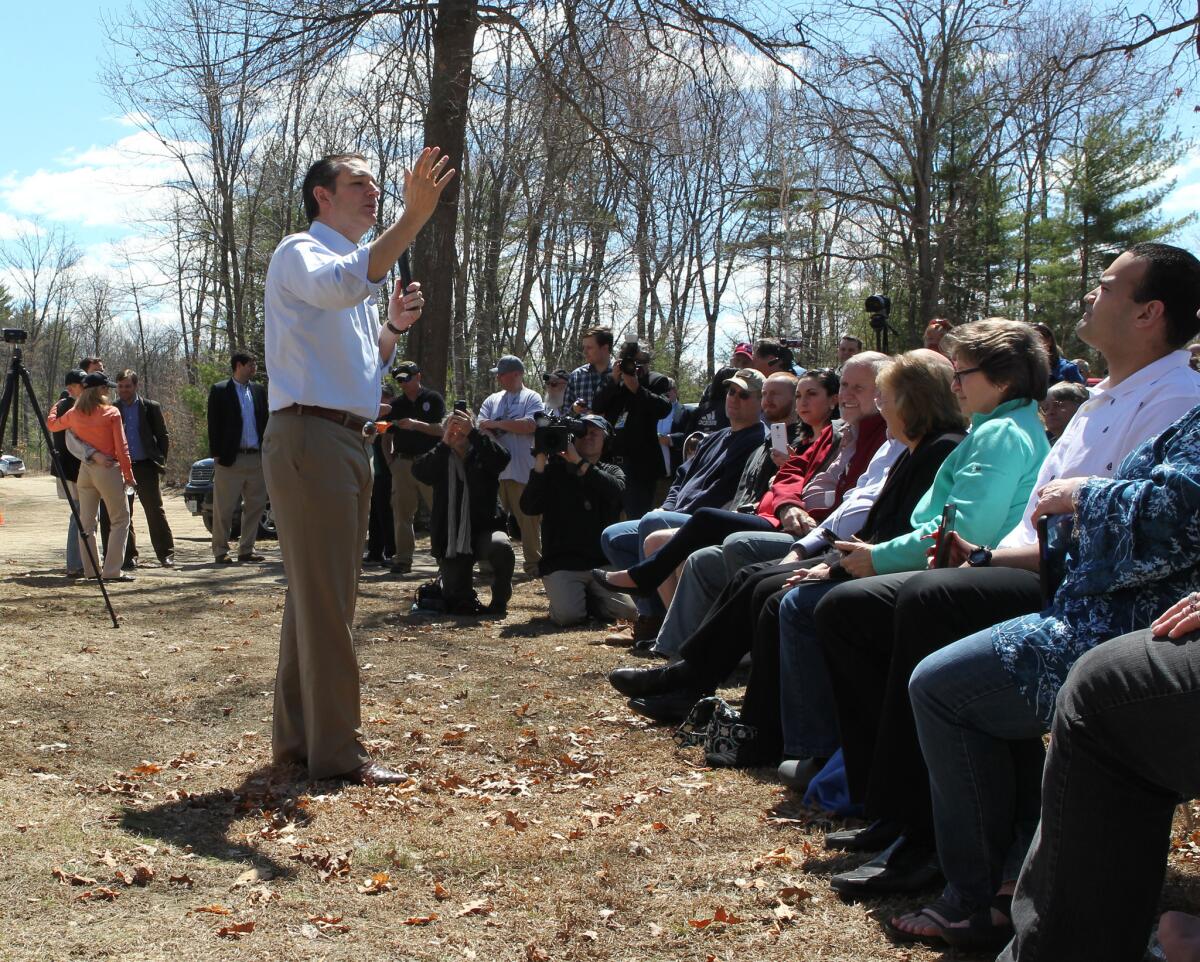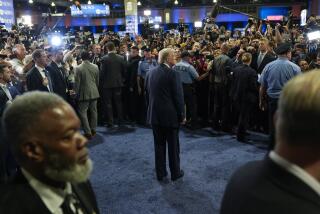New Hampshire fights to maintain its status in campaign season

Republican Sen. Ted Cruz of Texas speaks to potential supporters in Litchfield, N.H., on April 19. In an open letter Wednesday, party activists in New Hampshire and others called on the GOP to preserve the state’s importance in the presidential primary process.
- Share via
Reporting from Washington — A surge of presidential aspirants should be a good thing for New Hampshire and Iowa. More candidates mean more energy, more face time with a potential future president and more campaign cash left behind in the diners and coffee shops of political lore.
But some New Hampshire politicos have discovered you can have too much of a good thing.
The surplus of likely White House hopefuls – 16 and counting – is threatening to undermine the first-in-the-nation state’s status as a kingmaker of presidential politics, according to a group of activists who urged the Republican National Committee to intervene on Wednesday.
At issue is the setup for the first primary debate to be hosted by Fox News on Aug. 6. The criteria the network plans to use to decide who can appear onstage will leave too many candidates out, the group argued in an open letter. By relying on national polling numbers, the network will limit the breadth of the debate, deprive candidates of needed exposure and cut off access to supporters around the country. It will “prematurely suppress the candidate field,” the group warned.
And that is New Hampshire’s job.
“Historically, it has been the responsibility of the early primary and caucus states to closely examine and winnow the field of candidates, and it is not in the electorate’s interest to have TV supplant this solemn duty,” wrote the group, which included more than 50 activists, former lawmakers and two former governors. “To do so would undermine the very nature of our process and the valuable service that states like New Hampshire provide voters across the country.”
Anxiety about New Hampshire’s role isn’t new. It and Iowa, the first caucus state, perennially worry that their grip on the presidential process may be weakening. This year, the rise of “super PAC”-enabled mega-donors may mean that some candidates won’t have to worry about running out of cash if they can’t register enough support in Iowa and New Hampshire. There also appears to be an increasing number of candidates willing to jump in the race without much chance of winning – merely to raise their media profile, expand their donor base or jump-start a second chapter in a flagging career.
In an effort to prevent overcrowding onstage, Fox News has said it will limit the debate to the candidates in the “top 10 of an average of the five most recent national polls.” The network also promised to provide “additional coverage and air time” to candidates who fall short.
On Wednesday evening, the network announced it would host a forum for those candidates. The event will air in the afternoon, just hours before the prime-time debate.
Currently, the polling averages show a pretty clear lineup of eight or nine front-runners for the main event, leaving a fierce competition for the 10th lectern.
Former Florida Gov. Jeb Bush, Wisconsin Gov. Scott Walker, Florida Sen. Marco Rubio, retired neurosurgeon Ben Carson, Kentucky Sen. Rand Paul, former Arkansas Gov. Mike Huckabee, Texas Sen. Ted Cruz, former Texas Gov. Rick Perry and New Jersey Gov. Chris Christie would probably make the cut, assuming they all run.
If media magnate Donald Trump gets in the race, as he’s suggested he will next week, he would probably snag a spot. That leaves a long list of hopefuls off the stage, including several who in any other year might be considered real contenders.
Ohio Gov. John Kasich, former Pennsylvania Sen. Rick Santorum, South Carolina Sen. Lindsey Graham, former Hewlett-Packard Chief Executive Carly Fiorina, Louisiana Gov. Bobby Jindal and former New York Gov. George Pataki are all question marks.
It’s no surprise that some of these candidates’ supporters were among those who signed the letter Wednesday, addressed to Fox News President Roger Ailes and Republican National Committee Chairman Reince Priebus.
The group suggested an alternative solution for handling the unwieldy lineup. The network could divide the field into two debates. The top six candidates would randomly be assigned to one panel or the other, the group suggested.
Priebus responded to the letter by reiterating his support for the Fox News debate or another with similar criteria to be hosted by CNN.
“We are very pleased that both CNN and Fox will give all candidates [who poll] over 1% significant exposure,” Priebus said.
A Fox News representative did not immediately respond to a request for comment.
Twitter: @khennessey
More to Read
Sign up for Essential California
The most important California stories and recommendations in your inbox every morning.
You may occasionally receive promotional content from the Los Angeles Times.










